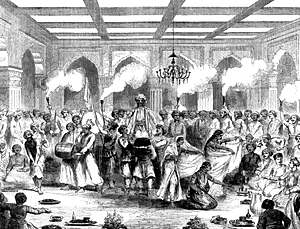| THE HOOLIE [HOLI] HINDOO FESTIVAL |
| "During the progress of the Indian revolt, we have illustrated from time to time some of the most striking observances of the native population, as as affording several picturesque scenes of their festivals and holidays. The present illustration shows the Hoolie, a Hindoo festival, held in the vernal equinox - the authority for this drawing being a native drawing. |
| "'In this Indian saturnalia (says Mr. Stocqueler, in his recently-published handy-book on India) the disciples of the Prophet mingle with the heartiest goodwill, apparently too much delighted with general license and frolic revelries of that strange carnival to be withheld from joining it by horror of its heathen origin.' The cermonials observed at its celebration are not confined to the processions out of doors: persons of wealth and respectability having an Imaum-burrah constructed in the interior of their own dwellings; this is usually a square building, containing a hall and other apartments, in which the assemblages during the festival are congregated. |
| "In the accompanying illustration there is abundance of music, feasting, torchlight, and dancers; and the owner of the mansion is brought in with triumph to graces the festival. |
| "Bishop Heber, in his very interesting Indian Journal, has several entries of the Hindoo observance. Thus, he records seeing at Sawa several drunken persons; and adds, 'I had seen very few drunken men before; but the time of Hoolie is now coming on, which is the Hindoo carnival, and in which the people of Central India more particularly indulge in all kinds of riot and festivity. The sopoys of my guard have begun to assail the women whom they pass on their marches with singing and indecent language -a thing seldom practised at other times. This is also the season for pelting each other with red powder, as we have seen practised in Calcutta.' |
| "Under March 5, at Chotee Sirwan, the Biship notes: - 'this being the great day of Hoolie, all my Hindoo servants came to pay their compliments and bring presents of red powder and sugar&45;plums. The event was rather costly to me, as I was obliged to make presents in return. But it is the 'dustoor,' and who in India can transgress that unwritten but common law of the land?' Elsewhere he says, 'During all the time of the Hoolie, drunkeness is common among the Hindoos, and our bearers have been for some days giving proof of it.' |
| "Under March 10, at Jhalloda, a small town with a bazaar, a mosque and a pagoda, the Bishop was serenaded by a Hindoo party. He tells us that 'A number of Bheels, men and women came to the camp, with bamboos in their hands, and the women with their clothes so scanty and tucked so high as to leave the whole limb nearly bare. They had a drum, horn, and some other rude minstrelsy, and said they were to come to celebrate the Hoolie. They drew up in two parties, and had a mock fight, in which at first the female had much the advantage, having very slender poles, while the men had only short cudgels, with which they had some difficulty in guarding their heads. At first some of the women began to strike a little too hard, on which their antagonists lost temper and closed with them so fiercely the the poor females were put to the rout in real or pretended terror. They collected a little money in the camp, and then went on to another village. The Hoolie, according to the orthodox system, was over; but these games are often prolonged for several days after its conclusion.' |
| "One of the Hoolie diversions, by the way, is what in Engliand is called making April fools, by sending persons on errands and expeditions that end in disappointment and raising a laugh against them. 'The Hoolie (says Colonel Pierce, in the 'Asiatic Researches') is always held in March, and the last day is the general holiday.' In India high and low join in the fooling custom; and Suraja Doulah told Colonel Pearce that he was very fond of making Hoolie fools, though he was a Mussulman [Muslim] of the highest rank. |
| "They carry the joke so far as to carry letters making appointments in the names of persons who, it is known, must be absent from their homes at the time fixed upon; and the laugh is always in proportion to the trouble given. |
| "The least inquiry into the ancient customs of Persia (notes Brand, in his Popular Antiquities), or the minutest acquaintance with the general astronomical mythology of Asia, would have told Colonel Pearce that the boundless hilarity and jocund sports prevalent on the first day of April in England, and during the Hindoo festival of India, have their origin in the ancient practice of celebrating with festival rites the period of the Vernal equinox, or the day when the new year of Persia anciently begins." |

